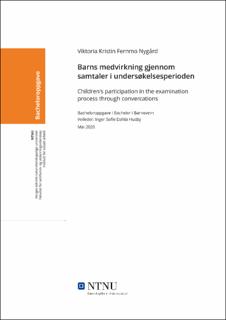Barns medvirkning gjennom samtaler i undersøkelsesperioden
Bachelor thesis
Permanent lenke
https://hdl.handle.net/11250/3096265Utgivelsesdato
2020Metadata
Vis full innførselSamlinger
- Institutt for sosialt arbeid [1393]
Sammendrag
Synet på barns deltakelse i barnevernet har over de siste årene blitt utfordret av ny kunnskap om barns kompetanse og utvikling. Dette har ført til at barnet har fått status som rettssubjekt under saksbehandlingen i barnevernstjenesten. Dermed har barna også fått rettighet til å medvirke i beslutninger som omhandler deres liv. Denne oppgaven tar for seg de juridiske rammene rundt barns medvirkning, utviklingen av barnets brukermedvirkning i barnevernet og hvordan samtaler i undersøkelsesperioden kan fremme dette. Barns synspunkter om hva som må til for å at de skal sitte igjen med opplevelsen av å ha fått muligheten til medvirkning vil også bli beskrevet. Å fremme barns medvirkning innebærer et samarbeid som kan utfordre den tradisjonelle måten vi har sett på barnevern. Oppgaven presenterer derfor også utfordringer saksbehandlere og barn kan oppleve i gjennomføringen av samtalene. Til slutt drøftes hvordan saksbehandler i samarbeid med organisasjonen og barna kan løse disse. Over the past years, the view on children's participation in Child Protective Services has been challenged by new knowledge about children's competence and development. As a result, all children are now to be recognized as a person before the law during proceedings regarding the Child Protective Services. Therefore, children are also given the right to participate in decision-making processes that will affect their own lives. This paper discusses the legal framework concerning children's participation, the development in children's right to participate, and how conversations during the examination process can help to encourage these practices. Moreover, this paper will describe children's perspectives on what is necessary for them to feel like they were given the opportunity to participate and contribute during the case. The promotion of children's participation includes a collaboration that could challenge our traditional perception of the Child Protective Services. In correlation to this, the paper presents different challenges faced by social workers and children during these conversations. Finally, it will discuss how social workers in collaboration with the organization and the children can find solutions to these issues.
